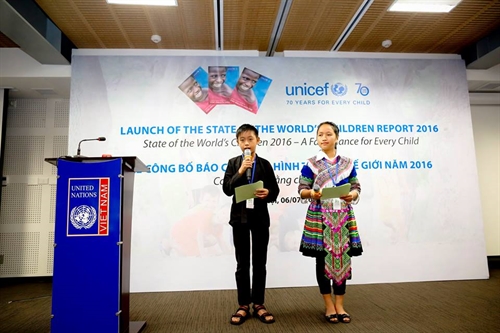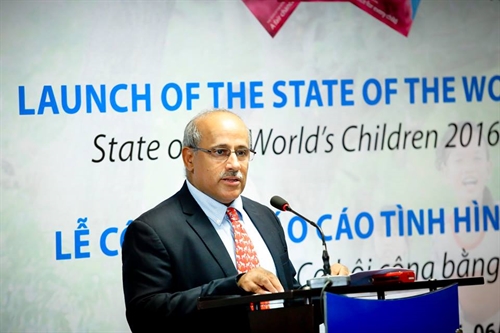 Society
Society

Việt Nam has made significant progress in saving children’s lives, getting children into school and lifting people out of poverty, but this progress has been neither even nor fair, said the latest United Nations Children's Emergency Fund (UNICEF) annual flagship report launched yesterday in Hà Nội.
 |
| A swimming class in the central Nghệ An Province. According to UNICEF, Việt Nam has made significant progress in saving children’s lives. - VNS/VNS Photo Bích Huệ |
HÀ NỘI – Việt Nam has made significant progress in saving children’s lives, getting children into school and lifting people out of poverty, but this progress has been neither even nor fair, according to the latest United Nations Children’s Emergency Fund (UNICEF) annual flagship report, released yesterday in Hà Nội.
The report, The State Of the World’s Children 2016 - A Fair Chance for Every Child, notes that in Việt Nam, poverty rates declined from 58 per cent to 10 per cent between 1993 and 2014. The child mortality rate fell from 36 per 1,000 live births in 1990 to 10 per 1,000 in 2014.
But due to poor nutrition, the stunted growth rate among children in rural areas of Việt Nam is twice as high as the stunting rate among their peers in urban areas, which can explain why infant mortality rates have worsened among ethnic minority groups despite the overall improvement.
Maternal mortality remains four times higher in mountainous areas than in lowland areas.
More than 60 per cent of ethnic minority households do not have access to adequate sanitation.
Education plays a unique role in breaking the intergenerational cycle of vulnerability. The percentage of children who have never attended school is relatively high in Việt Nam, especially among some ethnic minority groups. For example, almost one quarter of school-aged Mông ethnic minority children have never attended school or received any form of formal education.
“Denying millions of children a fair chance in life fuels the intergenerational cycles of disadvantage; it imperils the future of the society,” said UNICEF Representative Youssouf Abdel-Jelil.
“Việt Nam has the choice to invest now to give a fair chance to every child and to make the country more equal and inclusive,” he said.
He said UNICEF’s support would look at addressing barriers and bottlenecks that kept children away from the support and services they need. Laws like the recently adopted Child Law set the tone for positive transformation, but the nation should continue to translate this commitment into action through equity-focused programmes and public spending, he said.
The country also must shift public spending in order to better serve the most excluded, he added.
Inequity is neither inevitable nor insurmountable, the report argued.
Chấu Thị Tảo, 17, a Mông ethnic minority who has been brought up at the Lào Cai Centre for Social Work Services, asked concerned ministries and agencies to consider the best interests of the child in every decision and policy directly related to children, which helps ensure the realisation of children’s rights.
Schools and communities should provide children with opportunities to express their ideas on issues that affect them, especially children’s rights, she said.
Deputy Minister of Labour, Invalids and Social Affairs Doãn Mậu Diệp said that after 25 years of implementing the International Convention on the Rights of the Child, Việt Nam reached its Millennium Development Goals on gender equality, making primary education compulsory and improving children’s and mothers’ health.
Strong support from international organisations, especially UNICEF, and the country’s efforts to complete its system of laws and policies, will help improve the care and protection of children, ensuring an equal chance for every child, he said. – VNS
 |
| Two ethnic minority children from the northern mountainous province of Lào Cai express their hope for better care for the children in the future. – Photo Courtesy of the UNICEF |
 |
| Youssouf Abdel-Jelil, UNICEF Representative in Việt Nam, gives a speech at the report launching ceremony. – Photo Courtesy of the UNICEF |

.jpg)


